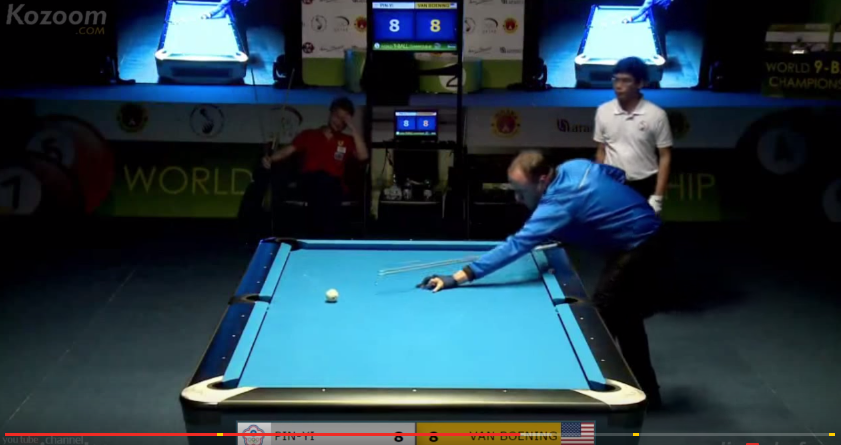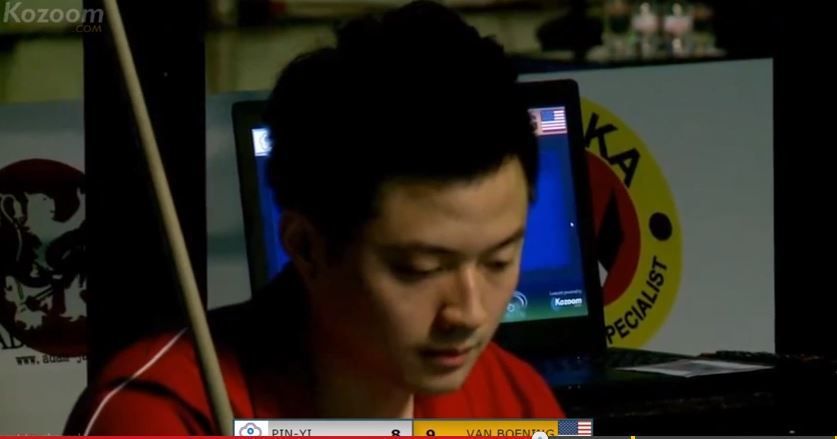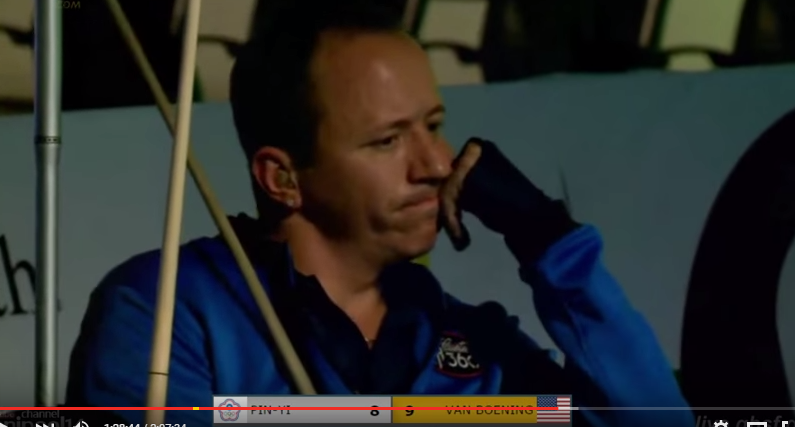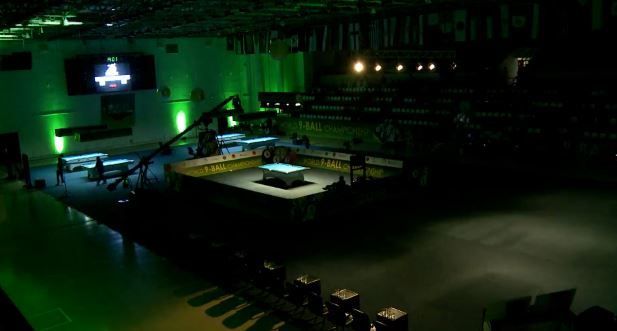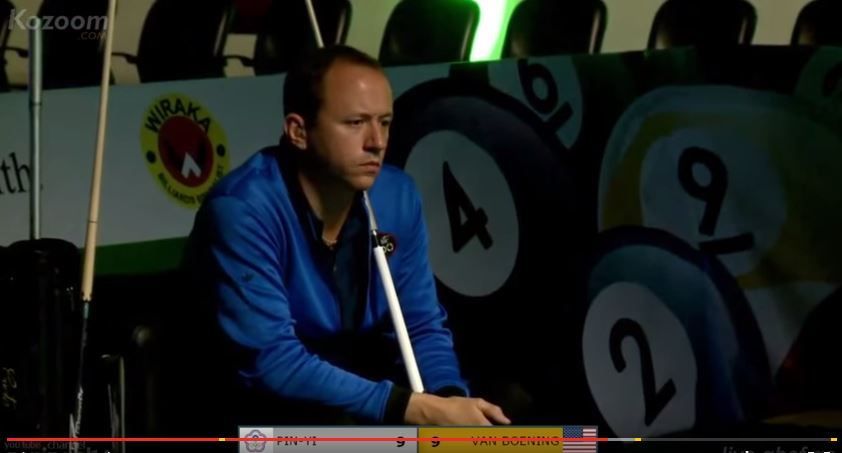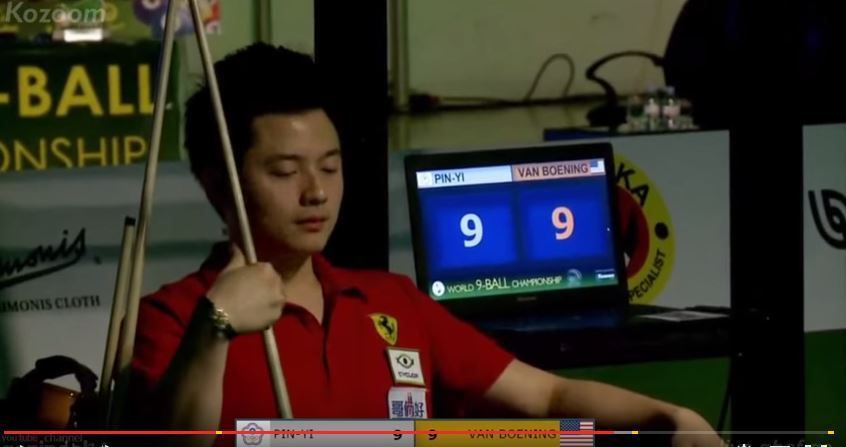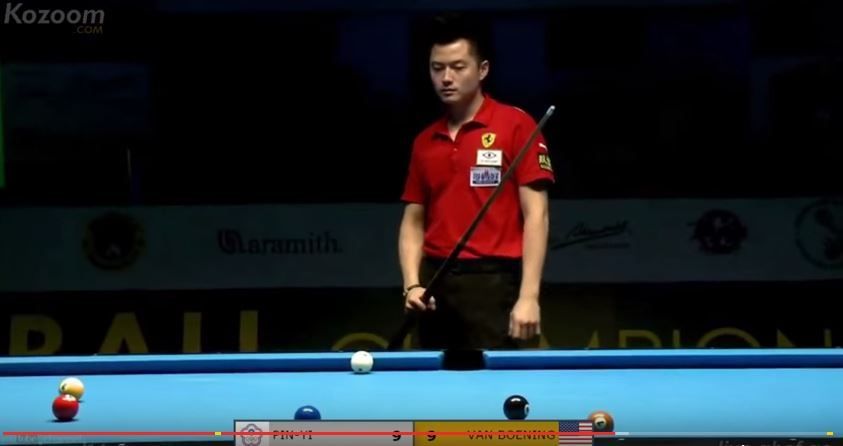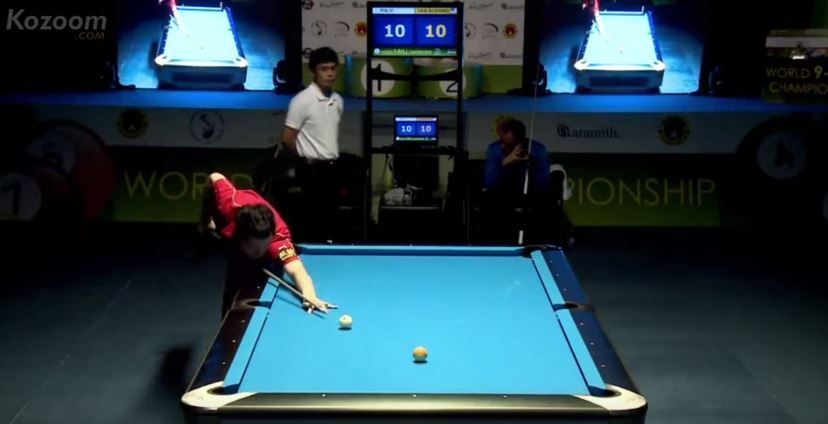Ko vs Shane Finals
Natural Progression of the Sport: The Traveling Pro Pool Coach
Part 1:
“When I was in 6th grade in elementary school I started to play pool in my father's pool club. Since I first played pool, my father has always been my coach,” said Ko.
“He always accompanies me on my travels. I’ve learnt a lot from him, not only pool skill, but also the manner of being polite.” In common with many other top-class Taiwanese shooters, practice is a serious business with long hours put in using often repetitious drills until the confidence of solid technique is built.
Source: http://blog.xuite.net/stradivarius/blog/17090833-Just+who+is+Ko+Pin-yi+?
This is not a critique of Shane or Ko, but more of an observation and deeper analysis into the finals match from yesterday.
Over the last 10 years, I’ve kept notice of a trend, or more so, a common fabric between many young champion players from Asia and Europe in the sport of pocket billiards.
In the formative years in Europe and most of Asia, a young pool player will take up with a coach and begin instruction. Thorsten Hohmann discussed this in the 2008 14.1 Invitational player-review DVD of his 149 ball run. Thorsten discussed with Danny Di LiBerto that he still has the same coach today as the guy who first opened up the door to the local billiard club to let him inside. Thorsten's work on the PAT training regiment with German coaches Ralph Eckert and Andreas Huber is well documented.
In the summer of 2007, at the Turning Stone classic, I was able to sit with Michael Neumann, the trainer and coach of Jasmine Ouschan and discuss his role in her career development. I watched as he sat in the stands and took notes, as well as photographs on the tough spots in matches and what little changes she could make. At one point in the tournament, Jasmine was frustrated with her 9-ball break not producing results, and Neumann was table side with instruction on changing it up. Between matches, he was even there with electrolyte packs for her, like holding out the cup of water for the marathon runner as they pass mile marker 15.
In the words of Mike Neumann:
Now, after working very intensively for more than 15 years with Jasmin Ouschan my fields of duty have broadened. Rather than being a single trainer I am currently responsible for the management of her career and for her coaching, as her training is now largely complete
Meanwhile, Jasmin is a very successful professional sports athlete and we are travelling more than 200 days per year worldwide together to be a part of events and tournaments.
Source: http://www.billiardsportacademy.com/michael-neumann/#go_page_now
Niels Feijen’s career was greatly effected by the coaching of Johan Ruijsink – the non-playing captain and coach of Europe’s Mosconi Cup Team.
Niels wrote in his website biography:
The gambling life took it's toll again once when I came back home. I got depressed again and had no motivation in Holland. I started with personal trainings to talk about what was bothering me and this really helped me. I started to relax more in any location and I became a better tournament player.
Johan Ruysink also opened up a poolroom in a city near by called Leidschendam and he did a lot for me by sponsoring me there!!
Source: http://www.nielsfeijen.nl/content.php?id=2
Ralf Souquet would refer to Johan as “The best coach ever”.
American player and Master Instructor Bert Kinister, who also worked with Niels in America, wrote about Johan:
Finally on the road to Johan’s home, night club and pool room in The Hague, we coasted in under cover of darkness with no brakes, no gas, no sleep and there they were waiting—I do not know for how long—eight to 12 young men acting like a drill team, waiting to learn pool.
Johan was ex-Dutch Special Forces, an expert in discipline and teamwork. This explained all of the eager teenagers waiting for us in the middle of the night, and Johan’s tireless work ethic.
Source: https://www.sneakypetemafia.com/the-value-of-a-coach-bert-kinister/
The list could go on and on. From John Morra and his coach/father Mario Morra in Canada to Jennifer Beretta and her personal billiards coach, Stu (our very own SJM-who she has worked with weekly for over a decade on her game).
From my observations, it seems for the most part, American and Filipino players are more solitary in nature, as is the pool culture. In America, pool players will take one-off lessons from various coaches, sometimes hopping from one coach to another to get proper analysis of their game. But then it is back off to the pool hall by themselves, and in tournament play, they become their own coach.
Yes, unless there are unlimited funds or a billiard academy down the street, all good players have to eventually become their own coach in a way. But with the Americans and Filipino players, the solitary pool warrior is usually the status quo.
This is how our pool culture always was though. Luther Lassiter didn’t have a coach by his side and neither did Efren Reyes. Their early careers and instruction were centered on gambling and action games.
But the game of pocket billiards has been progressing towards a sport for many years now. The players are becoming more athletic, focusing on physical workouts as much as drills on the table. And other countries are following suit:
Years of hard work among the grass-roots of Taiwanese pool established a system that saw the game find its way into high school educational programmes and with it government funding.
That structure paid dividends in 2005 when 18-year-old Wu Chia-ching (left) became the second Taiwanese player to win the World 9 Ball when he beat countryman Kuo Po-cheng in a thrilling final in Kaohsiung.
Source: http://blog.xuite.net/stradivarius/blog/17090833-Just+who+is+Ko+Pin-yi+?
Niels Feijen, on his early years in the sport, writes:
A big thing also happened in Holland: The Olympic Commitee gave pool the highest status. This meant that if players reached the quarterfinal in the European or World Championships, they got their A-Status which meant a monthly income through pool!!
Source: http://www.nielsfeijen.nl/content.php?id=2
And with those government funds, a professional billiard coach follows.
Natural Progression of the Sport: The Traveling Pro Pool Coach
Part 1:
“When I was in 6th grade in elementary school I started to play pool in my father's pool club. Since I first played pool, my father has always been my coach,” said Ko.
“He always accompanies me on my travels. I’ve learnt a lot from him, not only pool skill, but also the manner of being polite.” In common with many other top-class Taiwanese shooters, practice is a serious business with long hours put in using often repetitious drills until the confidence of solid technique is built.
Source: http://blog.xuite.net/stradivarius/blog/17090833-Just+who+is+Ko+Pin-yi+?
This is not a critique of Shane or Ko, but more of an observation and deeper analysis into the finals match from yesterday.
Over the last 10 years, I’ve kept notice of a trend, or more so, a common fabric between many young champion players from Asia and Europe in the sport of pocket billiards.
In the formative years in Europe and most of Asia, a young pool player will take up with a coach and begin instruction. Thorsten Hohmann discussed this in the 2008 14.1 Invitational player-review DVD of his 149 ball run. Thorsten discussed with Danny Di LiBerto that he still has the same coach today as the guy who first opened up the door to the local billiard club to let him inside. Thorsten's work on the PAT training regiment with German coaches Ralph Eckert and Andreas Huber is well documented.
In the summer of 2007, at the Turning Stone classic, I was able to sit with Michael Neumann, the trainer and coach of Jasmine Ouschan and discuss his role in her career development. I watched as he sat in the stands and took notes, as well as photographs on the tough spots in matches and what little changes she could make. At one point in the tournament, Jasmine was frustrated with her 9-ball break not producing results, and Neumann was table side with instruction on changing it up. Between matches, he was even there with electrolyte packs for her, like holding out the cup of water for the marathon runner as they pass mile marker 15.
In the words of Mike Neumann:
Now, after working very intensively for more than 15 years with Jasmin Ouschan my fields of duty have broadened. Rather than being a single trainer I am currently responsible for the management of her career and for her coaching, as her training is now largely complete
Meanwhile, Jasmin is a very successful professional sports athlete and we are travelling more than 200 days per year worldwide together to be a part of events and tournaments.
Source: http://www.billiardsportacademy.com/michael-neumann/#go_page_now
Niels Feijen’s career was greatly effected by the coaching of Johan Ruijsink – the non-playing captain and coach of Europe’s Mosconi Cup Team.
Niels wrote in his website biography:
The gambling life took it's toll again once when I came back home. I got depressed again and had no motivation in Holland. I started with personal trainings to talk about what was bothering me and this really helped me. I started to relax more in any location and I became a better tournament player.
Johan Ruysink also opened up a poolroom in a city near by called Leidschendam and he did a lot for me by sponsoring me there!!
Source: http://www.nielsfeijen.nl/content.php?id=2
Ralf Souquet would refer to Johan as “The best coach ever”.
American player and Master Instructor Bert Kinister, who also worked with Niels in America, wrote about Johan:
Finally on the road to Johan’s home, night club and pool room in The Hague, we coasted in under cover of darkness with no brakes, no gas, no sleep and there they were waiting—I do not know for how long—eight to 12 young men acting like a drill team, waiting to learn pool.
Johan was ex-Dutch Special Forces, an expert in discipline and teamwork. This explained all of the eager teenagers waiting for us in the middle of the night, and Johan’s tireless work ethic.
Source: https://www.sneakypetemafia.com/the-value-of-a-coach-bert-kinister/
The list could go on and on. From John Morra and his coach/father Mario Morra in Canada to Jennifer Beretta and her personal billiards coach, Stu (our very own SJM-who she has worked with weekly for over a decade on her game).
From my observations, it seems for the most part, American and Filipino players are more solitary in nature, as is the pool culture. In America, pool players will take one-off lessons from various coaches, sometimes hopping from one coach to another to get proper analysis of their game. But then it is back off to the pool hall by themselves, and in tournament play, they become their own coach.
Yes, unless there are unlimited funds or a billiard academy down the street, all good players have to eventually become their own coach in a way. But with the Americans and Filipino players, the solitary pool warrior is usually the status quo.
This is how our pool culture always was though. Luther Lassiter didn’t have a coach by his side and neither did Efren Reyes. Their early careers and instruction were centered on gambling and action games.
But the game of pocket billiards has been progressing towards a sport for many years now. The players are becoming more athletic, focusing on physical workouts as much as drills on the table. And other countries are following suit:
Years of hard work among the grass-roots of Taiwanese pool established a system that saw the game find its way into high school educational programmes and with it government funding.
That structure paid dividends in 2005 when 18-year-old Wu Chia-ching (left) became the second Taiwanese player to win the World 9 Ball when he beat countryman Kuo Po-cheng in a thrilling final in Kaohsiung.
Source: http://blog.xuite.net/stradivarius/blog/17090833-Just+who+is+Ko+Pin-yi+?
Niels Feijen, on his early years in the sport, writes:
A big thing also happened in Holland: The Olympic Commitee gave pool the highest status. This meant that if players reached the quarterfinal in the European or World Championships, they got their A-Status which meant a monthly income through pool!!
Source: http://www.nielsfeijen.nl/content.php?id=2
And with those government funds, a professional billiard coach follows.
